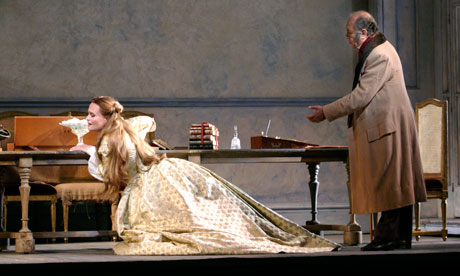
"The Royal Opera needs a Traviata that can withstand regular revival", reported this paper, presciently, on the premiere of Richard Eyre's production. That was 17 years ago. Eyre's and Bob Crowley's sumptuous cash cow has rarely left the milking shed since. The gigantic blank mirror – which warns the dying heroine that she casts no shadow in the world – has towered over Violettas from Angela Gheorghiu and Renée Fleming to Ermonela Jaho and Anna Netrebko; all different, all excellent. The latter pair return next year, but it was Netrebko's compatriot Marina Poplavskaya who fired the starting gun on this four-month Traviatathon.
Poplavskaya's Violetta is astoundingly good. Her voice doesn't have the pure beauty of Netrebko, or the radiance of Fleming, but it has a penetration few can match. Even at its most thin and fragile, it cuts through the ensemble with an uncanny, searing presence. In full cry, her tone is now more rounded, but it still has a breathtaking urgency that gets to the heart of a characterisation which – bolstered by totally absorbed acting and by a face whose inscrutable pallour even Da Vinci would have failed to capture – is superbly authentic.
She thus makes the most of a staging that does its utmost to help its audience to see the drama through 19th-century eyes. Leo Nucci, though his voice is frayed at the edges, still impresses as Alfredo's father (or perhaps grandfather), while James Valenti's Alfredo is melodious but lacking dramatic weight. Germont's claim that the relationship would never have lasted has rarely looked so credible. As for the orchestra, they gave another absolutely ravishing account of Verdi's score, not helped by Jan Latham-Koenig, whose conducting (if that's the right term) they mostly ignored. There's another relationship which may not last.

